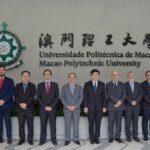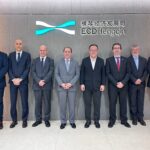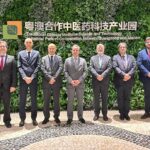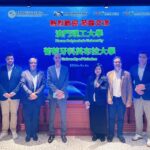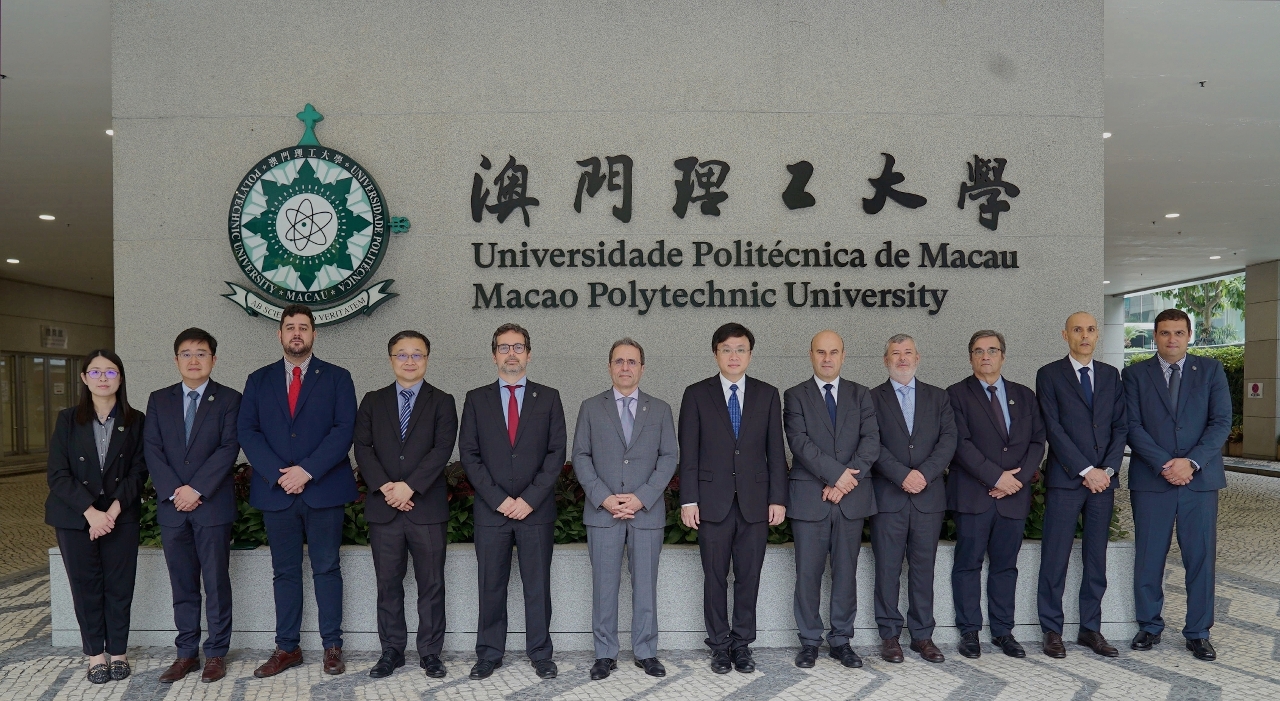 Amílcar Falcão (sixth from the left), Rector of the University of Coimbra, Portugal leads delegation to visit MPU, fostering advancements in health and technology.
Amílcar Falcão (sixth from the left), Rector of the University of Coimbra, Portugal leads delegation to visit MPU, fostering advancements in health and technology.
In order to expand Macao's role as the “Sino-Portuguese platform,” the delegation led by Amílcar Falcão, Rector of the University of Coimbra (UC) and Honorary Doctor of Science of Macao Polytechnic University (MPU), visited MPU and received a warm welcome from Im Sio Kei, Rector of MPU. During the visit, discussions were held to promote cooperation between Portugal and Macao in the fields of health and high technology, fostering a pleasant atmosphere.
Im Sio Kei stated that, with the support of the Macao SAR government, MPU and UC have carried out comprehensive academic cooperation and achieved fruitful results. The two universities have jointly organized a doctoral program in computer applied technology and held the inauguration ceremony of the “MPU-UC Joint Research Laboratory in Advanced Technologies for Smart Cities” in Portugal. The ceremony was unveiled by the Secretary for Social Affairs and Culture of the Macao SAR Government, Ao Ieong U, with the aim of cultivating high-tech and scientific research talents for Macao. The two universities will further strengthen their cooperation and jointly promote the innovative development of higher education in Macao and Portuguese-speaking countries.
Amílcar Falcão stated that UC and MPU have a longstanding cooperation. During his visit to Macao and the Guangdong-Macao In-Depth Cooperation Zone in Hengqin, he was deeply impressed by Hengqin and its broad prospects for development. The collaboration between Portugal, Macao, and Hengqin promotes the linkage between China and Portugal in the transfer and transformation of scientific and technological achievements, innovation and entrepreneurship, and technology collaboration. He expects to develop the aging research projects with MPU to support the development of health and high-tech industries in Macao and Hengqin.
During the visit, accompanied by representatives from MPU, the UC delegation visited the Economic and Technological Development Bureau, the Macao Trade and Investment Promotion Institute, and the Science and Technology Development Fund of the Macao SAR Government to learn about the economic, trade, and scientific research cooperation between Macao and Portugal. The delegation also visited the Economic Development Bureau, the Centre for Science and Technology Exchange and Cooperation between China and Portuguese-Speaking Countries, and the Traditional Chinese Medicine Science and Technology Industrial Park of Cooperation between Guangdong and Macao in Hengqin, to explore new opportunities for cooperation among universities in Portuguese-speaking countries under the background of the Guangdong-Macao linkage. In addition, the delegation went to Guangzhou and Shenzhen to visit the Council for the Promotion of Guangdong-Macao Development (Nansha, Guangzhou); “The Timetable” the Youth Entrepreneurship Base of Guangdong, Hong Kong, and Macao; Guangdong, Hong Kong and Macao (International) Youth Entrepreneur Hub; the Hong Kong University of Science and Technology Fok Ying Tung Research Institute; and Shenzhen BYD Company Limited (Headquarters), to examine the youth innovation and entrepreneurship environment in the Greater Bay Area and the development of high-tech enterprises to promote the potential for scientific and technological exchanges and cooperation between China and Portugal.
The UC delegation also included: Nuno Mendonça, Pro-Rector; Manuel Santos, Scientific Director of the Multidisciplinary Institute for Aging; João Malva, Scientific Coordinator of Aging@Coimbra; Luís Silva, Head of the Technology Transfer Division - UC Business; and Ricardo Dias, Innovation Coordinator - UC Business.


